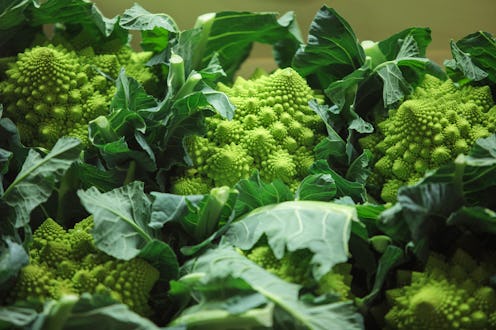Life
7 Foods That Can Improve Your Gut Health In Ways You Wouldn’t Expect

One of the least understood keys to our health may be the gut microbiome, that complicated mix of bacteria that lives in your digestive system. Researchers know now that it can impact a lot of illnesses, including mental health disorders, thanks to its connection to the brain and other organs. Luckily, there's an easy way to influence your gut health: your diet. What we eat every day directly impacts and shapes our gut health, and there are certain foods that help boost its functioning. Research around probiotics is always changing, but right now science says it's a good idea to maintain your microbiome with food, and eating these foods can improve your gut health.
"Your gut bacteria are extremely important for many aspects of health," notes Healthline. "The best way to maintain a healthy microbiota is to eat a range of fresh, whole foods, mainly from plant sources like fruits, veggies, legumes, beans and whole grains."
When it comes to a healthy gut, diversity in the microbiome is important; a 2018 study found that people who ate around 30 different plant types per week had more diverse biomes than people who ate around ten. Diversity means more species of bacteria and fungi happily living and making your gut work. And remember that scientists are still figuring out precisely what a "healthy gut" is in different people. If you eat a certain "gut-boosting" food and don't feel well or react badly, listen to what your gut's telling you and quit eating them for a while.
Here are seven foods that can improve your gut's health and feed that microbiome all kinds of tasty treats.
1Walnuts
A study in 2018 found that walnuts can improve your gut health. "When you consume walnuts, it increases microbes that produce butyrate, a beneficial metabolite for colonic health. So the interaction of walnuts with the microbiome is helping to produce some of those health effects," lead author Dr. Hannah Holscher said in a press release. Other kinds of nuts are also part of a healthy gut, but walnuts in particular seem to show benefits.
2Cranberries
Cranberries can't actually help out with your UTIs, but they appear to be great for your gut, according to research published in 2017. It turns out that a particular kind of gut bacterium "utilizes cranberry xyloglucans as a sole energy and carbon source," explains the study. Xyloglucans are a type of substance found in cell walls, and it turns out that the variety in cranberries is very tasty for a healthy variety of gut bacteria.
3Probiotic Foods
If there's one substance that definitely has a good rep for helping gut health, it's probiotic substances — but that label covers more than you might think. There are a lot of different probiotic foods and drinks, and scientists still discovering how they can help us, from yogurts to fermented kefir.
You can consume probiotics in several ways: probiotic yogurts often have cultured strains of bacteria added, while other foods like naturally fermented kimchi grow healthy strains of bacteria as they age. These strains, when digested, help the bacteria already in the gut to function properly. "Probiotic administration seems to have a great potential in terms of health that justifies more research," said a review of the science in 2014. Studies in 2018 found that some people respond better to probiotic substances than others, so stay tuned for more science about refining your probiotic intake.
4Leafy Greens
You definitely have to eat your greens. A 2016 study published in Nature found that the leafy variety, including kale and spinach, contain a substance that enriches your gut bacteria: sugar sulfoquinovose. "Every time we eat leafy green vegetables we consume significant amounts of SQ sugars, which are used as an energy source by good gut bacteria," lead author Ethan Goddard-Borger explained in a press release. SQ sugars provide the fuel for gut bacteria to grow, and help them live healthy existences in our digestive system.
5Broccoli
Broccoli and other cruciferous vegetables, like the much-maligned Brussels sprout, are the source of an important substance for gut health, according to research from Penn State in 2017. They provide a crucial ingredient for a chemical that protects the barriers of the stomach and other organs in the digestive system, protecting against "leaky gut," where toxins can easily pass into the system. Professor Gary Perdew, lead author, noted in a press release, "If you have problems, like a leaky gut, and start to suffer inflammation, that may then lead to other conditions, like arthritis and heart disease."
6Insects
Crickets may not be on your menu right now, but food experts think they're one of the foods of the future. And research now indicates that they may also improve gut health. According to a study in Nature in 2018, consuming ground crickets is tied to the growth of healthy gut bacteria. "Cricket powder supported growth of the probiotic bacterium, Bifidobacterium animalis," the study explained. One day you might be recommended powdered insects to help your gut microbiome.
7Fibrous Veggies
You've probably heard that fiber is essential to good bowel movements, but it's also necessary for a healthy microbiome and digestion. "High-fiber foods such as legumes, beans, peas, oats, bananas, berries, asparagus, and leeks have shown a positive impact on gut health in numerous studies," explains Healthline. Those prebiotics you're always hearing about? That's just a fancy word for dietary fiber. A study in 2018 found that fiber in the gut has a huge positive effect on the microbes living there, and that boosting fiber is a good idea to help the microbiome's ecology.
8
Want a healthy gut? Introduce more leafy greens, walnuts, and probiotic yogurts into your diet if you want to increase your gut health — and get all those benefits that go along with it.